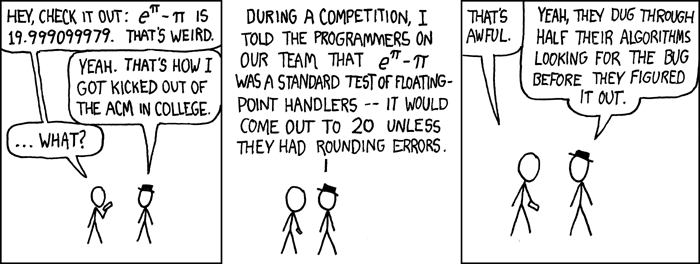Re: e^pi - pi + 9/10^4 + 1/(10^4*ln(2) + sqrt(10)/6)^2
Message #32 Posted by Dieter on 8 Aug 2012, 5:23 p.m.,
in response to message #31 by Gerson W. Barbosa
If the TI-57 actually uses 11 internal digits the result is fine: Both for 11- and 12-digit machines the perfect result is a plain 20.
However, the last (11th) digit on the -57 seems to be truncated instead of rounded. Take a look at your example: you get 0.5714285 while, correctly rounded, it should be 0.5714286. ;-)
BTW, I took that 34s program and inserted some print commands. Here are the intermediate results for 10, 11 and 12 digits:
10 digits
3,141592654
23,14069264
19,99909999
19,99999999
0,6931471806
3,16227766
0,5270462767
6.931,998852
48.052.608,08
2,081052496e-8
20,00000001
11 digits
3,1415926536
23,140692633
19,999099979
19,999999979
0,69314718056
3,1622776602
0,5270462767
6.931,9988519
48.052.608,083
2,0810524962e-8
20
12 digits
3,14159265359
23,1406926328
19,9990999792
19,9999999792
0,69314718056
3,16227766017
0,5270462767
6.931,99885188
48.052.608,0825
2,08105249622e-8
20
Just in case, if you want to compare this with what you get from the -57. ;-)
Dieter
|
